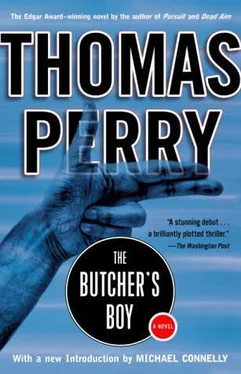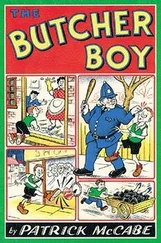He had been driving almost continuously for over forty-eight hours, and now he knew he had to sleep. He parked the car outside his room and carried his suitcase inside. Then he went back to the car for his cooler. He brought it into the kitchenette and opened it. The Blue Ice he’d bought in St. Louis was still surprisingly cold, but he took it out and put it in the freezer to prepare for tomorrow. Then he said aloud, “You too, Edgar. Got to keep fresh.” When he had finished loading the freezer he rinsed out the inside of the cooler, checked the locks on the door a second time, and lay down on the bed. He fell immediately into a nervous, troubled sleep. Late in the night he found himself partially awake, reaching for the pistol in his coat pocket. He took off the coat and laid it beside him on the bed. After that he slept soundly, dreamlessly, until the maid’s morning knock startled him at eleven.
WHEN HE PASSED BUFFALO in the middle of the afternoon he thought of Maureen. He supposed she must be somewhere nearby, taking a rest and counting her money while she waited for the old man to offer her the next job. She’d been expensive, probably not worth that kind of money, but he didn’t regret what he’d paid her. She’d caught him at a time when he was in the mood to be extravagant, so she was entitled to it. That was part of the business.
He knew exactly where he was going. He’d seen the place once, when he and Eddie had been trying to fill the contract on Danny Lazaro. He’d owned a two-year-old filly named The Commodore’s Pride, and Eddie had figured he’d come to Saratoga to watch her run. Eddie had been wrong, and they’d ended up watching the races and then driving around the area looking at the farms. It was a country composed of low, rolling green hills and small stands of ancient oaks and maples cordoned by the same white rail fences that lined the road.
“It’s so the horses won’t kill the trees,” Eddie had said. “The fuckers are worse than beavers.” He’d made a note to ask somebody about that who knew something about horses, but he’d forgotten about it until now. Eddie had probably made it up. Eddie had lived in big cities all his life. If he knew anything about horses it was probably from carving them up to look like prime rib.
They drove past a large farm with a low stone fence, partitioned into paddocks and pastures where tall chestnut-colored horses strolled in elegant leisure, and Eddie had said, “Know who owns that place?” He’d shrugged, and Eddie had said triumphantly, “Carlo fucking Balacontano, Esquire. That’s who.”
That night somebody else had collected on Danny Lazaro. They’d found him in New York in a little French restaurant on the West Side, and when Eddie read it in the papers he’d said, “No big thing. He missed a good race.” Rochester and Syracuse and Utica floated by as green signs on the New York State Thruway. It was almost ten o’clock by the time he swung north on Route 87 at Albany.
At eleven he saw the sign that said Saratoga Springs 15. He thought, I’ll make the call by one o’clock, from Plattsburgh. I could be in Montreal by three, or New York City by four or five. It won’t matter where I am, because in another day there won’t be anybody looking for me. By tomorrow night they’ll all know it’s no longer worth the risk. Because they’ll all believe the man they hoped to please is beyond doing anything for them. Whatever he offered them will be just words. And they’ll be thinking about something else. Some of them will lie low and wait to see who comes to the top in the five families and inherits New York, and some won’t be able to wait for that: they’ll run to Toscanzio or Tony Damon to anticipate the stampede.
He turned off at Saratoga Springs and drove to the farm. Even in the dark he recognized the white rail fences and the distant buildings. At the first boundary there was a small sign that said Montpelier Farms. And then in smaller letters, Arabians and Standardbreds. He wished he’d looked at the place in the daylight. Did horses get locked up at night? Did they even run loose in February? He drove along the fence studying what he could see of the acres beyond. There were three pastures, all empty snowdrifts and patches of frozen grass, and a smaller area near the stable that was trampled into mud. He decided that must be where they rode horses or trained them. Beyond that was a track, just like a racetrack only without a grandstand. On a knoll above the track stood the house. That was what power meant, he thought—so much empty land around Bala’s house that he had to build a road to get to it, probably had to drive to see his own horses eating his own grass. He probably didn’t come here more than a few times a year. And probably not at all in February. It was too cold out there for horses, he thought, too cold even to watch them.
It was going to be more difficult than he’d thought. There were at least two or three hundred yards of empty land between the highway and the house, and most of it was covered with snow. He couldn’t drive it and he couldn’t afford to leave footprints. And it was cold out there: the ground would be frozen solid. But there had to be a way. He’d come too far to give up.
He drove past the farm and thought about the problem. There was only one way to do it, and he knew he had to accept that. But it wasn’t going to be pleasant. He turned the car around and drove back into Saratoga Springs. It took him a half hour to find a store that was open. It was a supermarket that seemed at this hour to deal mainly in beer, but he found what he needed—a pair of gloves, a knitted watch cap, a package of heavy plastic trash bags, and a roll of thick adhesive tape.
He parked the car a mile down the road from the farm in a closed gas station and made his preparations. He sawed the handle of the shovel off to the length of a foot and a half, then went around to the trunk. He shook out four of his plastic trash bags and placed them one inside of the other for extra strength, then opened the cooler. “Come on, Edgar,” he said, “last stop.” The walk was cold, but he knew it had to be done this way. Whoever Bala had to take care of his horses would be alarmed by a strange car parked close to the farm, and a car would be of no use to him now anyway.
When he reached the farm he walked along the white fence until he came to a point where another rail fence intersected it, dividing the two pastures. He was glad he’d bought the hat and gloves. He had to take off the gloves to fish out the adhesive tape. He put the shovel and gun inside one plastic bag, and taped the two bags together to form a sling, which he threw over his shoulder.
He climbed up on the fence, his feet on the bottom rail and his hands clinging to the top rail. He began to sidestep along the fence between the two pastures, moving in the direction of the farm buildings. He inched along, slowly at first, but before long he found he could make good progress by keeping as much weight as possible on his feet. The pastures were empty, but now he could see horse tracks in the snow. They must let them out sometimes during the day, he thought. He wondered how the horses felt about it.
It took him over ten minutes to reach the place where the fence intersected with the section that ran along Balacontano’s private road. He stopped to rest and read his watch in the moonlight. It was already after midnight, and there was no telling how long this was going to take. If only it weren’t so cold. As he approached the house, he realized something was wrong. From the pasture side it looked as though every light were on. Cautiously, he sidestepped closer along the rail. Balacontano’s caretaker wouldn’t have all those lights on, and grooms and stableboys wouldn’t be inside the main house. In spite of the cold he began to sweat. He leaned over the fence and stared at the snow on the driveway. It was crossed with what looked like a dozen treadmark patterns. There were the thick jagged impressions of truck tires, at least two different patterns of studded snow tires, and a few ruts made by the smoother treads of road tires. Shit, he thought, he’s here right now, and he’s got some of his people with him. Of course he’d be here. Nobody can get within three hundred yards of the house without being seen. He looked at the house again and thought, there might be twenty or thirty of them sitting around in there to protect him. In New York City he’d have to make do with two or three.
Читать дальше












